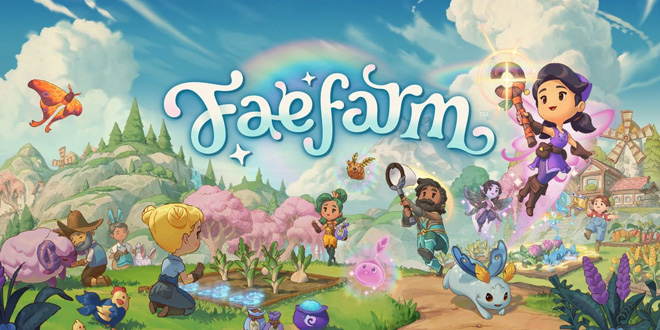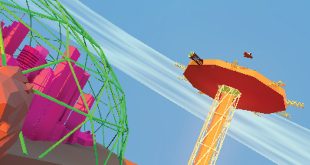 Isaac Epp, game director of Fae Farm at Phoenix Labs, tells Vince Pavey about the challenges of infusing the cosy life sim genre with a dash of fairy magic and adventure.
Isaac Epp, game director of Fae Farm at Phoenix Labs, tells Vince Pavey about the challenges of infusing the cosy life sim genre with a dash of fairy magic and adventure.
Fae Farm is the second game by the Vancouver-based studio and publisher Phoenix Labs, and is its take on the ‘cosy farm-sim’ genre that is becoming an increasingly fruitful market for the current crop of indie game developers. It’s a low-stakes good time, where those that play will wash up on an island and soon find themselves exploring, crafting, decorating, helping out a varied cast of characters with quests, and maybe even taking part in a little romance.
It was also a very unexpected title from the team behind Dauntless, a popular free-to-play action game where you fight raging behemoths. So how did the developers at Phoenix Labs decide to start making Fae Farm at all?
“The project really evolved and matured way beyond its initial scope,” explains Epp. “Katie De Sousa, Fae Farm’s creative director, started working on the game with a very small team initially, just a handful of folks. This was initially envisioned as a passion project, and eventually the studio leads approached Katie and asked if she’d be interested in developing it in-house at Phoenix Labs. From there, the project became the main focus for a large portion of the development team, and we expanded upon Katie’s initial vision but kept the DNA of that vision intact throughout.”
A lot of the inspiration for Fae Farm comes from popular cosy game titles made by companies over in Japan, although one of the biggest influences might come as a bit of a surprise.
“We’re all huge fans of all the games in the cosy genre space,” continues Epp. “You can’t talk about cosy games without mentioning series like Harvest Moon and Animal Crossing, which we obviously adore, but we were also inspired by plenty of titles outside that space as well. One title that I like to bring up is Link’s Awakening, and the feeling of adventure and mystery imbued into the fabric of that story. We want players to feel that same sense of adventure when they play Fae Farm.”
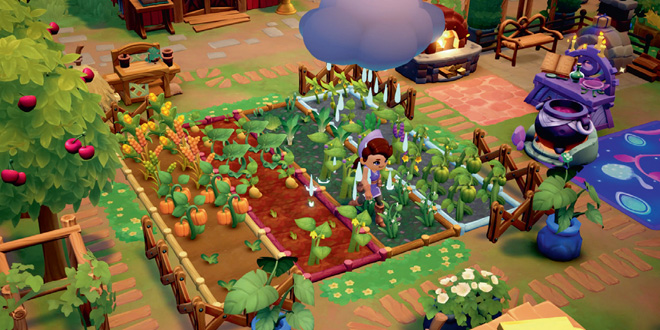
FARMING MEETS FANTASY
As we mentioned earlier, Phoenix Labs’ previous game Dauntless is an action game. In fact, it was more like a free-to-play version of Capcom’s action game Monster Hunter than anything else on the market at the time of its release. It might seem rather strange that the team would go make a cosy life sim game next, but Epp reckons that the studio was always equipped to do it.
“Fae Farm was a very different project for us after Dauntless, and though they are wildly different thematically, there are a couple things that they have in common,” explains Epp. “For one, fans of Dauntless know that we pride ourselves in our seamless multiplayer experiences, and we wanted nothing less for Fae Farm. We wanted to ensure that players can easily join up and play cooperatively, just as they can in Dauntless.
“Dauntless offers up a certain player fantasy that allows them to grow more powerful over time, and the same can be said of Fae Farm – the more you progress, the more magical spells become available and more powerful tools open up, allowing you to delve deeper into the dungeons and access even more powerful materials. You may also notice some artistic similarities since there are definitely overlapping artists’ hands in both.”
When it came to the design process, it was mostly about focusing on specific feelings and finding ways to dial them up for the player.
“Having the team playtest and find the magic and fun, iterating, and leaning into the surprises we come across is something that exists for both Fae Farm as well as Dauntless,” explains Epp. “That said, the entire premise and purpose is pretty drastically different, so for Fae Farm, we were constantly on the lookout for areas where the game would start feel more or less cosy, more or less welcoming, more or less charming, and we’d keep adjusting towards keeping it as cosy, welcoming, and charming as we could. Dauntless was all about feeling like a badass with your friends and slaying behemoths together, so the through-line wasn’t all that close between the games there.
“I can also say though, in both experiences, ‘game feel’ was always something that’s held high and kept at the top of what matters. Just getting around is something that we feel should always be great.”
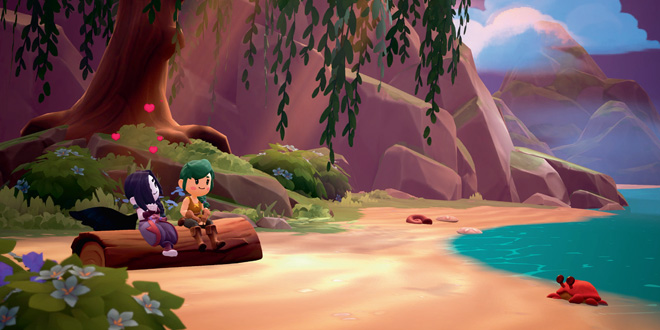
POLISHING AND PUBLISHING
One thing that sets Phoenix Labs apart from a lot of indie developers is that it self-publishes its own games, which as Epp tells it, is an advantage when it comes to marketing. “We have a large, seasoned in-house publishing team, which I think is fairly uncommon at independent game studios,” explains Epp. “On Fae Farm they helped drive our strategy with platform holders like Nintendo and Steam, to promote the game at industry events, engage with media and content creators, and build our Fae Farm community from the ground up. Being able to control your own destiny from a publishing and marketing perspective is certainly a boon for developers.”
Of course, it can also be a bit of a headache. “I think keeping everyone happy is always going to be a challenge,” continues Epp. “You want to do everything you can to ensure you’re putting your best foot forward regardless of the platform on which you publish, but navigating those conversations and challenges is always a bit of a puzzle, since no platform or platform holder operates in the same way.”
As you might expect, challenges came up during development, even including just finding ways to improve on the staples of the genre and set Fae Farm apart from predecessors in its space.
“I come from a UX background, so I’m really proud of the way we faced many of the user experience challenges over the course of development,” recalls Epp. “For instance, we really wanted to cut out what we perceive as inventory and tool micro-management that is commonplace in the genre, so we created a system that auto-selects a tool based on the spatial context of your character. What this means practically is that if you’re standing next to a tree, you will automatically switch to your wood axe, while if you’re standing next to a shrub, you will automatically switch to your scythe, and so on. “Much of what we were doing in Fae Farm was trying to take many of the things we loved so much about previous games in the genre, and then also be honest and look at the things we didn’t think felt great, and tried to reenvision, polish, and iterate until it felt like a significant step forward.”
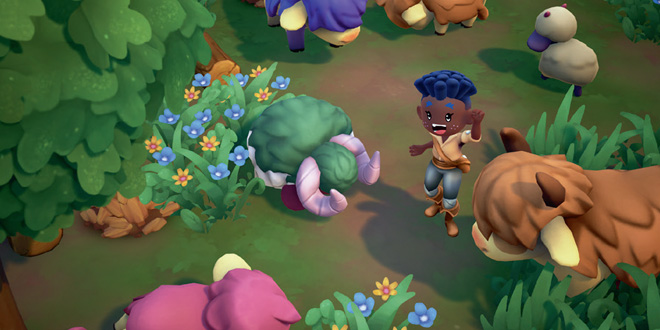
TOO MANY GOOD IDEAS
As for some of those steps forward, an advantage of modern game creation is that rather than giving in to ‘scope creep’ and letting things get out of hand or be delayed on the road to release, the best additional ideas can instead be given the proper time they need for development as long as the game is supported by the community.
“One of the other things we were challenged by was a classic game development issue where you just keep getting great ideas popping up from the team as you are making the game,” says Epp. “ Which is amazing and where some of the best things in games come from, but the hard thing is choosing which ones can make it in, and which other things have to end up staying in the backlog. “Thankfully, we are making patches and DLC that give us opportunities to get more of those cool ideas in the game for players over time. One of the great ideas that came up late was an amazing engineer, David Block, mentioning over a morning coffee chat with me about ‘Could one of our NPCs have a disability?’
“It was such a great idea, I mean, we have constantly tried to find more and more ways to welcome players into our game, and have tried our best to have players see folks like themselves in the world as well. I then spun up a small group of folks to consider having our Master Carpenter Aspen, given his cool skillset, move around in a mobility chair of his own design and making. “Kim Parker made an incredible concept for it, rigs, models, and designs were all adjusted, and in a very short time, we had Aspen cooler than ever in the game. We all loved it and Aspen instantly became one of our favourite NPCs. We did a sensitivity test to make sure we were doing something that the community could feel good about, and are so glad we did it. It was hard, and came in later in development, but the team wanted it badly enough that they just went the extra mile to get it in.”
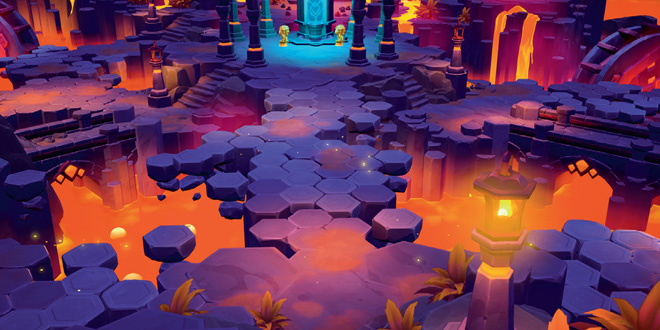
BRINGING PEOPLE TOGETHER
Fae Farm has now made it out into stores, and Epp maintains a healthy attitude to game development, showing no desire to change anything about the process that got the team and its game to this point.
“Well, all of us wish we’d be able to go back and undo mistakes we make along the way, but honestly, if we did that we’d not have learned the great lessons those missteps can give us,” muses Epp. “I’m incredibly proud of what we’ve built, and sure things like ‘I wish we had caught that bug before we shipped’ are in my mind, we did our best, and learned great lessons on the way too, so don’t dwell on “what could have been” too terribly much to be honest.” “I get asked for advice for people starting out a lot and what I tend to say is ‘Just go make stuff!’,” enthuses Epp. “You get better at making games by making games, and you should do it with other people. Whether it’s a simple board game prototype, or a game jam, or a student project, or an indie effort, you have to get the reps in to get great at it. Just know that you’ll make mistakes, and have bumps along the way, and that that is okay.”
The reaction to Fae Farm has been largely positive, and it has by this point managed to carve out a following and a space for itself in its niche. For Epp, however, the highlights of getting the game out there have been all about other people.
“When I saw a father reading the text to their young child who was playing Fae Farm at PAX West at a demo station, it was just pure magic to see,” reminisces Epp. “It was bringing people together. It was welcoming and accessible to a wide range of people, and I just knew, anyone that picked up the game would have a good time, and feel psychologically safe doing it, and be able to see themselves in what they were playing. That’s something I always want to be able to do going forward in all the games I make.
“We’re really heartened by the reaction to Fae Farm thus far,” Epp continues. “We’ve released a number of quality of life updates since launch as well, that address some of the feedback we’ve received from fans, and we have plenty more things planned to expand the world. We’re currently working on DLC releases for Fae Farm, the first of which we released in December, and we think players are going to really enjoy what we have in store for them.”

 MCV/DEVELOP News, events, research and jobs from the games industry
MCV/DEVELOP News, events, research and jobs from the games industry
